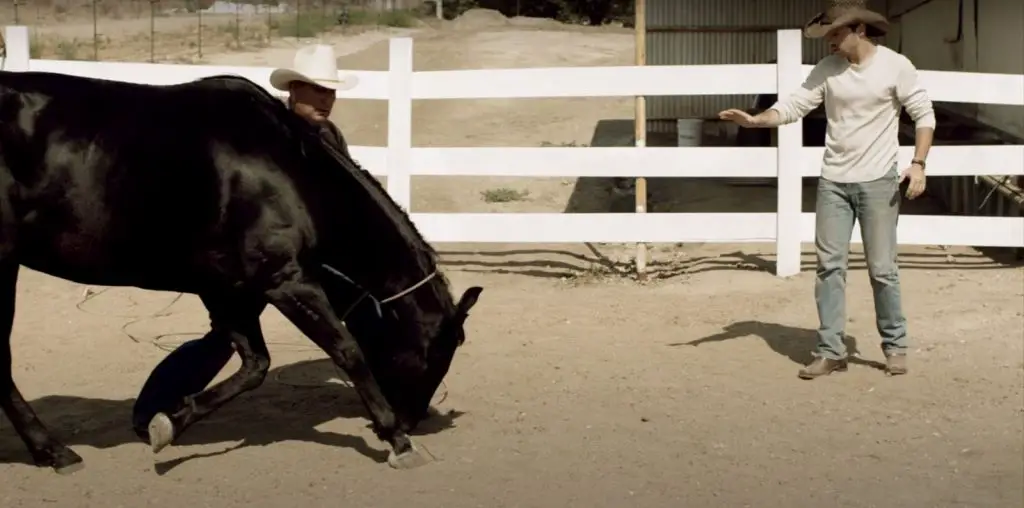
Director Daniel Stamm has developed an interesting pattern in his first three films—A Necessary Death, The Last Exorcism, and, now, 13 Sins (now available on streaming services like iTunes and Vudu); all deal with the horror of an average, normal society. Suicide, mortality, faith, doubt, economic desperation; Stamm’s films may interject themes of the supernatural but it is the way he deals with the horror in the hearts and minds of normal people that make him an interesting filmmaker.
His latest doesn’t hold up to his previous two works but it’s largely due to a tonal imbalance in the script and a disappointing climax more than Stamm’s execution. If anything, he elevates a modest bit of straight-to-DVD entertainment into something more intriguing. The final product is likely to draw undeserved comparisons to the superior Cheap Thrills (which actually played at SXSW a full year earlier but is being released on streaming platforms and in limited theatrical release due to the oddities of film distribution) but it has some twisted pleasures of its own to provide horror fans.
The inspiration for 13 Sins (besides the source material of the 2006 Thai film 13: Game of Death) is actually much older than Cheap Thrills or Saw (another film that may make an adequate modern comparison). We go back time and time again to the tale of Faust. How far would you go to have enough money to protect your family for decades to come? And would you go further if you had severe economic woes weighing on your chest and conscience? As with any deal with the devil, once you cross that threshold and commit to going down that path that steals your soul for earthly gains, there’s no turning back.
Such is the saga of Elliot Brindle (Mark Webber), a man planning for a wedding (to True Blood’s Rutina Wesley) when he’s fired from his job. Drowning in debt and forced to care for a father and brother who have difficulty doing so for themselves, Elliot is the prime subject for a deal with the devil. Although this Satan comes in an unusual form.
Brindle gets a phone call. The voice on the other end makes it clear, quickly, that he can see Elliot. Is it one of the nearby security cameras that have taken over our lives? Is it something more supernatural? Is that Satan on the other end of the cell phone? Or could the voice be in Elliot’s head?
Wherever it’s coming from, the proposition is an enticing one: Follow through on 13 challenges and earn $6.2 million. The first challenge seems simple enough: Swat that fly. Done. The second challenge? Eat it. Of course, the challenges get more intense as the rewards cross five figures and then six and Elliot draws the attention of the local police force (including an always-effective Ron Perlman). The “puppet master” keeps instructing Elliot that completing all 13 challenges will expunge the criminal record earned on this fateful day but exactly how that’s possible remains a mystery.
Stamm has always had a strong directorial skill with actors and he draws a solid, engaging performance from Webber, who has to sell the audience on the idea that Elliot wouldn’t ask more questions or fail to follow through on some of the tougher challenges. He’s particularly good in the second half of the piece, when the narrative gets more emotionally draining. The supporting cast too often feels like a plot device – especially Perlman, who pops up to push the plot forward when needed, and Wesley, who has the thankless role of the woman who just feels like another manipulative pawn in the game.
Ultimately, the script for 13 Sins is its biggest weakness, only sporadically dipping into what could have been a deeper pool of social commentary, such as when Elliot faces a challenge that demands he face bullies from his youth, and jumping around tonally. And the end gets a bit too twist-based and illogical for its own good. Stamm’s first two films beautifully played with audience expectation as to what exactly was going on and I wish there was more of that in this script – Is Elliot crazy? Will he go through with it? What’s the greater purpose of the entire game? I wanted more mystery and ambiguity and got less of it as the narrative progressed. Still, there’s a reason these Faustian tales keep sprouting up in our pop culture. We’re fascinated by how we would respond in the same nightmarish situation. And Daniel Stamm is fascinated by us.

